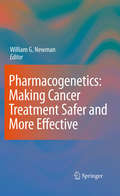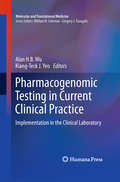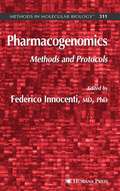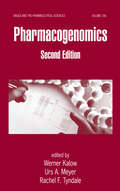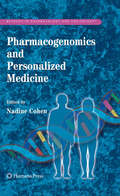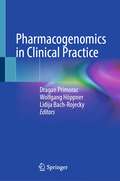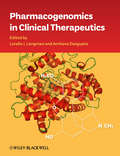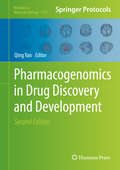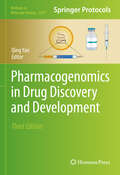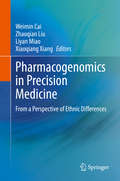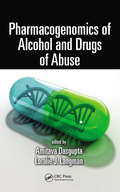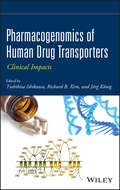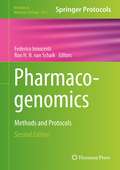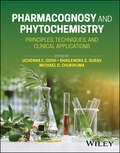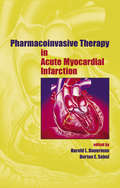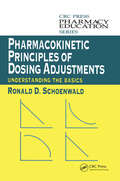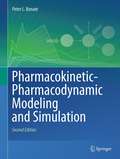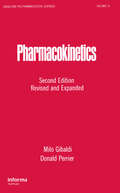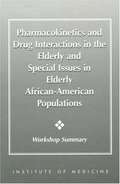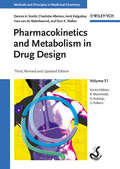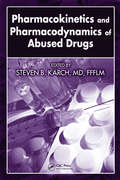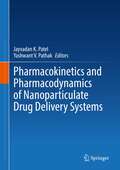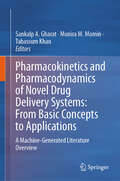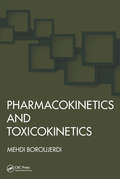- Table View
- List View
Pharmacogenetics: Making cancer treatment safer and more effective
by William G. NewmanChemotherapy has made a dramatic difference to improved survival in patients with cancer. However, not all patients respond and some experience serious side effects. "Pharmacogenetics: Making cancer treatment safer and more effective" is an up to date summary of the exciting new field of how genetic testing can tailor more effective prescription in oncology. It is targeted at oncologists and professionals involved in the treatment of patients with cancer. It provides a core background in genetics and pharmacological principles before providing chapters from acknowledged experts in the field on genetic tests in specific cancer types, including breast, bowel and lung cancer. Clinical cases are used to illustrate the practical application of this knowledge. Chapters on ethics, health economics and the industry aspects of pharmacogenetics set out the challenges and opportunities afforded by this new science.
Pharmacogenomic Testing in Current Clinical Practice
by Kiang-Teck J. Yeo Alan H. WuWhile the basic principles of personalized medicine and pharmacogenomics has been covered by numerous texts, there are none to date that focuses on the specific tests themselves that are in current clinical practice and those that are being proposed for implementation in the near future. Pharmacogenomic Testing in Current Clinical Practice: Implementation in the Clinical Laboratory focuses almost entirely on the specifics of each test that is needed to implement these tests into a clinical laboratory. This volume presents the first compilation of the tests currently in routine clinical use. The chapter authors of this unique and invaluable title comprise a range of renowned authorities and investigators who have conducted the essential clinical trials necessary to justify pharmacogenomic testing today. The book is divided into four parts: Basic Concepts, Specific Pharmacogenomic Targets, Drugs that Cause Delayed Hypersensitivity, and Miscellaneous Drugs. Each author provides a pharmacologic background on the target drug, the need for pharmacogenomic testing, and how results can be translated into clinical decisions. Where appropriate, case studies are given to illustrate typical clinical scenarios. An extensive bibliography is provided so that the reader can refer to the original studies. This well-designed resource will appeal to clinical laboratory directors who are contemplating or assigned the task of establishing a pharmacogenomics laboratory and a wide range of clinicians who must interpret results of testing. Focused and immensely useful, Pharmacogenomic Testing in Current Clinical Practice: Implementation in the Clinical Laboratory is a timely and outstanding contribution to the literature and will be instrumental in defining this rapidly growing field.
Pharmacogenomics
by Federico InnocentiExpert researchers and physician/clinicians describe in detail the newest and most commonly used technologies today in this rapidly advancing field. The authors provide readily reproducible methods for assessing the functional consequences of a certain polymorphism, evaluate the variety of genotyping platforms currently available, and discuss the management of pharmacogenomic information. Highlights include techniques for making a snapshot of the allele-specific variation in human gene expression, genome wide analysis of allele-specific expression using oligo microarrays, in vivo assays with HaploChIP, SNP genotyping in DNA pools, and PharmGKB, the pharmacogenetics and pharmacogenomics knowledge base. The methodologies for genotyping include denaturing high-performance liquid chromarography, pyrosequencing, kinetic-fluorescence detection, mass spectrometry, and TaqMan assay for insertion/deletions.
Pharmacogenomics (Drugs and the Pharmaceutical Sciences)
by Werner Kalow Rachel F. Tyndale Urs A. MeyerReflecting the shift from genetics to genomics in the pharmaceutical sphere, this Second Edition traces the evolution of the science of pharmacogenetics and gathers research from the forefront of the field-spanning the most influential breakthroughs in molecular diagnostics, metabonomics, proteomics, bioinformatics, disease mapping, pharmacodynamic
Pharmacogenomics and Personalized Medicine
by Nadine CohenWith all the multitude of challenges facing the pharmaceutical research and development process, the industry is actively exploring the relationships between human genetics and drug responsiveness, susceptibility to disease and disease severity. In Pharmacogenomics and Personalized Medicine, leading experts from the pharmaceutical industry, the scientific community and the government provide guidance for conducting pharmacogenomic research from discovery to the market, while also presenting a realistic perspective on the challenges, practicalities and obstacles in its application. Focusing on DNA data and associated analytical methodologies, with a consideration for complementary RNA-based studies, this volume includes a wide array of vital, cutting-edge research. Comprehensive and timely, Pharmacogenomics and Personalized Medicine will assist novice and experienced investigators alike in the understanding of the current scientific challenges in applying pharmacogenomics to drug discovery and clinical development.
Pharmacogenomics in Clinical Practice
by Dragan Primorac Wolfgang Höppner Lidija Bach-RojeckyThis book provides a practically applicable guide to the applications of pharmogenomics across medicine. Background information is provided on the mechanisms associated with membrane transporters, drug-metabolizing enzymes and their importance in pharmagenomics. Detailed guidance is subsequently presented on how to apply these techniques in disciplines including cardiology, gastroenterology, oncology, transplantation surgery, infectious diseases, anesthesia and analgesia, neurology, psychiatry, primary care, and public health. Clear easy-to-follow instructions are given on how to use big data technologies and public health databases in day-to-day clinical practice. Pharmacogenomics in Clinical Practice concisely covers how pharmacogenomic technologies and techniques can be applied in daily medical practice. It is therefore an ideal up-to-date resource for any medical practitioner, trainee or researcher across all medical disciplines who want to better understand how to use these techniques.
Pharmacogenomics in Clinical Therapeutics
by Amitava Dasgupta Loralie J. LangmanPharmacogenomics is the process of analyzing patients' genes to predict the onset of adverse reactions or forecast the effectiveness of therapeutic drugs. This useful text is written to discuss both the theory and the clinical application of the principles of pharmacogenomics. Current research has clearly established that a range of treatments may be greatly improved through genetic profiling of individual patients before certain therapies begin. Aimed at clinicians, pharmacologists, and clinical laboratory professionals this book discusses the important role of laboratory tests in the practice of personalized medicine. An important new book, Pharmacogenomics in Clinical Therapeutics serves as a guide to the basic principles of pharmacogenomics in a range of common therapeutic areas and as the basis of the personalized medicine of the future.
Pharmacogenomics in Clinical Therapeutics
by Amitava Dasgupta Loralie J. LangmanPharmacogenomics is the basis of personalized medicine which will be the medicine of the future. Through both reducing the numbers of adverse drug reactions and improving the use of existing drugs in targeted populations, pharmacogenomics represents a real advance on traditional therapeutic drug monitoring. Pharmacogenomics in Clinical Therapeutics provides an introduction to the principles of pharmacogenomics before addressing the pharmacogenomic aspects of key therapeutic areas such as warfarin therapy, cancer chemotherapy, therapy with immunosuppressants, antiretroviral therapy, and psychoactive drugs. It also includes methods of pharmacogenomic testing and the pharmacogenomic aspects of drug–drug interactions. From a team of expert contributors, Pharmacogenomics in Clinical Therapeutics is a comprehensive overview of the current state of pharmacogenomics in pharmacotherapy for all clinicians, pharmacologists and clinical laboratory professionals. It is also a guide for practicing clinicians and health care professionals to the basic principles of pharmacogenomics, laboratory tests currently available to aid clinicians, and the future promise of this developing field.
Pharmacogenomics in Drug Discovery and Development
by Qing YanThe field of pharmacogenomics arose to develop personalized medicine, or medicine that deals with the complexity of the human body. In this book, leading experts present methodical, state-of-the-art contributions covering topics from individual molecules to systemic diseases, examining both fundamental concepts and advanced technologies. The volume begins by exploring cutting-edge technologies used to pursue systems-based pharmacogenomics, followed by extensive chapters on gene-drug interactions and the use of pharmacogenomics in therapeutics of diseases. This book is ideal for scientists striving to transform disease treatment into disease prevention.
Pharmacogenomics in Drug Discovery and Development (Methods in Molecular Biology #2547)
by Qing YanThis new edition offers a state-of-the-art and integrative vision of pharmacogenomics by exploring new concepts and practical methodologies focusing on disease treatments, from cancers to cardiovascular and neurodegenerative disorders and more. The collection of these theoretical and experimental approaches facilitates problem-solving by tackling the complexity of personalized drug discovery and development. Written by leading experts in their fields for the highly successful Methods in Molecular Biology series, the book aims to provide across-the-board resources to support the translation of pharmacogenomics into better individualized health care. Authoritative and up-to-date, Pharmacogenomics in Drug Discovery and Development, Third Edition aims to aid researchers in approaching the challenges in pharmacogenomics and personalized medicine with the introduction of these novel ideas and cutting-edge methodologies.
Pharmacogenomics in Precision Medicine: From a Perspective of Ethnic Differences
by Weimin Cai Zhaoqian Liu Liyan Miao Xiaoqiang XiangThis book provides an introduction to the principles of pharmacogenomics and precision medicine, followed by the pharmacogenomics aspects of major therapeutic areas such as cardiovascular disease, cancer, organ transplantation, psychiatry, infection, antithrombotic drugs. It also includes genotyping technology and therapeutic drug monitoring in Pharmacogenomics; ethical, Legal and Regulatory Issues; cost-effectiveness of pharmacogenetics-guided treatment; application of pharmacogenomics in drug discovery and development and clinical Implementation of Pharmacogenomics for Personalized Precision Medicine. The contributors of Pharmacogenomics in Precision Medicine come from a team of experts, including professors from academic institutions and practitioner from hospital. It will give an in-depth overview of the current state of pharmacogenomics in drug therapy for all health care professionals and graduate students in the era of precision medicine.
Pharmacogenomics of Alcohol and Drugs of Abuse
by Amitava Dasgupta Loralie J. LangmanPharmacogenomics is the basis of personalized medicine, which is said to be the medicine of the future. Understanding genetic variation in drug and alcohol response is vital for professionals working in rehabilitation programs. The same principles that are applicable for therapeutic drugs are also applicable for drugs of abuse. Pharmacogenomics can
Pharmacogenomics of Human Drug Transporters: Clinical Impacts
by Richard B. Kim Toshihisa Ishikawa Jörg KönigSets the foundation for safer, more effective drug therapies With this book as their guide, readers will discover how to apply our current understanding of the pharmacogenomics of drug transporters to advance their own drug discovery and development efforts. In particular, the book explains how new findings in the field now enable researchers to more accurately predict drug interactions and adverse drug reactions. Moreover, it sets the foundation for the development of drug therapies that are tailored to an individual patient's genetics. Pharmacogenomics of Human Drug Transporters serves as a comprehensive guide to how transporters regulate the absorption, distribution, and elimination of drugs in the body as well as how an individual's genome affects those processes. The book's eighteen chapters have been authored by a team of leading pioneers in the field. Based on their own laboratory and clinical experience as well as a thorough review of the literature, these authors explore all facets of drug transporter pharmacogenomics, including: Individual drug transporters and transporter families and their clinical significance Principles of altered drug transport in drug–drug interactions, pharmacotherapy, and personalized medicine Emerging new technologies for rapid detection of genetic polymorphisms Clinical aspects of genetic polymorphisms in major drug transporter genes Future research directions of drug transporter pharmacogenomics and the prospect of individualized medicine Pharmacogenomics of Human Drug Transporters opens the door to new drug discovery and development breakthroughs leading to safer and more effective customized drug therapies.The book is recommended for pharmaceutical scientists, biochemists, pharmacologists, clinicians, and genetics and genomics researchers.
Pharmacogenomics: Methods and Protocols
by Federico Innocenti Ron H.N. SchaikUnderstanding an individual's genetic makeup is the key to creating personalized drugs with greater efficacy and safety, and pharmacogenomics aims to study the complex genetic basis of inter-patient variability in response to drug therapy. Based upon the success of its first edition, the second edition of Pharmacogenomics: Methods And Protocols aims to continue providing readers with high-quality content on the most innovative and commonly adopted technologies in the field of pharmacogenomics as presented by experts in the field. Broken into several sections, this detailed volume examines techniques for interrogating variation in human genes and genomes, functional assessment of genetic variation, both in vitro and in vivo, as well as tools for translation and implementation of pharmacogenetic markers. Written in the highly successful Methods in Molecular BiologyTM series format, chapters include introductions to the respective topics, lists of the necessary materials and reagents, step-by-step, readily reproducible laboratory protocols, and key tips on troubleshooting and avoiding known pitfalls. Comprehensive and thoroughly updated, Pharmacogenomics: Methods And Protocols, Second Edition serves as an essential reference and an invaluable source on the latest information in this field.
Pharmacognosy and Phytochemistry: Principles, Techniques, and Clinical Applications
by Shailendra S. Gurav Uchenna E. Odoh Michael O. ChukwumaKey information on plant-based chemical and pharmacology research, from basics and principles through recent technological advances Pharmacognosy and Phytochemistry provides an overview of the basics of pharmacognosy and phytochemistry from early principles through contemporary advances like molecular pharmacognosy. The book covers the classification of crude drugs, complementary and alternative medical (CAM) systems, adulteration and evaluation of drugs, extraction methods of plant drugs, and ethnobotany and ethnopharmacology. The book also reviews the historical overview, therapeutic application, cultural and ecological dimensions of plant-based medicines. Other key chapters discuss biotechnology and clinical pharmacognosy. Written by a group of expert contributors, Pharmacognosy and Phytochemistry reviews sample topics including: Methodologies for extracting bioactive compounds and techniques to perform qualitative and quantitative phytochemical analysisTherapeutic potential of plant secondary metabolites and the processes of isolation, purification, and characterization of herbal drugsBiological screening methods and biosynthetic pathways of phytopharmaceuticals, pharmaceutical aids, nutraceuticals, cosmeceuticals, pesticides, and allergensComparative phytochemistry, chemotaxonomy, and the emerging field of marine pharmacognosy Combining traditional knowledge with modern advancements to provide a holistic understanding of two important fields, Pharmacognosy and Phytochemistry serves as an excellent resource for students, researchers, and practitioners.
Pharmacoinvasive Therapy in Acute Myocardial Infarction (Fundamental and Clinical Cardiology)
by Burton E. Sobel Harold DauermanThis reference collects the latest scientific evidence illustrating the increasing importance of pharmacoinvasive therapy in the treatment of ST elevation acute myocardial infarction-tracking the origins, evolution, and limitations of current treatment methods and highlighting new clinical trial data showcasing the potential of the combined treatme
Pharmacokinetic Principles of Dosing Adjustments: Understanding the Basics (Pharmacy Education Series)
by Ronald D. SchoenwaldThis book has evolved over the last twenty years from a cumulative effort to develop a professional course in pharmacokinetics that would assist future practitioners in therapeutic decision making. As practicing pharmacists become more involved with patient advising, it becomes apparent that clinicians will be required to make dosing adjustments for certain drugs. This will become increasingly more likely as pharmacy practitioners have access to patient information that requires careful attention to dose and dosing interval, which in turn correlates to various pharmacokinetic parameters such as half-life and the volume of distribution of drugs. Although many handbooks are available on this subject, they do not devote more than a brief chapter to the concepts behind the dosing adjustment approach. Pharmacokinetic Principles of Dosing Adjustments provides the concepts used to formulate approaches. Equations that appear in various chapters are developed, not through lengthy derivations, but by more of an intuitive approach. The equations are presented in their conceptual form, rather than a separate convenient form applicable to each clinic situation. This method is used to demonstrate how you can apply the initial conditions to the properties of the drug, patient and/or route of administration, rather than memorizing each variation of the basic equation. The author defines pertinent pharmacokinetic terms as well as kinetic processes and classical modeling relevant to dosing adjustments. Examples are included within each chapter that emphasize an understanding of the concepts. Pharmacokinetic Principles of Dosing Adjustments was written for practitioners who operate in a setting that requires careful consideration to dosing parameters and, in particular, with patients that require constant monitoring of therapeutic outcomes including dosing adjustments. Based on the introductory course in pharmacokinetics taught by Dr. Schoenwald for the past twenty years, this book is intended as a review and resource for practicing pharmacists.
Pharmacokinetic-Pharmacodynamic Modeling and Simulation, 2nd Edition
by Peter L. BonateThis is a second edition to the original published by Springer in 2006. The comprehensive volume takes a textbook approach systematically developing the field by starting from linear models and then moving up to generalized linear and non-linear mixed effects models. Since the first edition was published the field has grown considerably in terms of maturity and technicality. The second edition of the book therefore considerably expands with the addition of three new chapters relating to Bayesian models, Generalized linear and nonlinear mixed effects models, and Principles of simulation. In addition, many of the other chapters have been expanded and updated.
Pharmacokinetics (Drugs and the Pharmaceutical Sciences)
by Milo Gibaldi Donald PerrierThis book is based on research papers and commentaries on pharmacokinetic methods and applications published since 1975. It offers detailed examinations of new developments in the pharmacokinetic field with enhanced clarity of presentation and simplified organization.
Pharmacokinetics and Drug Interactions in the Elderly and Special Issues in Elderly African-American Populations: Workshop Summary
by Committee on Pharmacokinetics Drug Interactions in the ElderlyA report on Pharmacokinetics and Drug Interactions in the Elderly and Special Issues in Elderly African-American Populations
Pharmacokinetics and Metabolism in Drug Design (Methods and Principles in Medicinal Chemistry #51)
by Raimund Mannhold Gerd Folkers Hugo KubinyiIn this new edition of a bestseller, all the contents have been brought upto-date by addressing current standards and best practices in the assessment and prediction of ADMET properties. Although the previous chapter layout has been retained, substantial revisions have been made, with new topics such as pro-drugs, active metabolites and transporters covered in detail in a manner useful to the Drug Discovery scientist. The authors discuss the parameters and processes important for the absorption, distribution and retention of drug compounds in the body, plus the potential problems created by their transformation into toxic byproducts. While aimed at all those dealing professionally with the development and application of pharmaceutical substances, the readily comprehensible style makes this book equally suitable for students of pharmacy and related subjects. Uniquely comprehensive, the book relates physicochemistry and chemical structure to pharmacokinetic properties and ultimately drug efficacy and safety.
Pharmacokinetics and Pharmacodynamics of Abused Drugs
by Steven B. KarchThis book is a concise and focused volume on the metabolism and measurable effects of drugs on the human body. Beginning with basic concepts and models, the book details the specifics of absorption, distribution, and elimination mechanisms and rates of commonly abused drugs. It analyzes the effects of drug use on human performance including response time, memory and cognition, and physiological changes. Packed with data and comparative studies, this handy volume considers the effects of marketed and prescription medications as well as illicit drugs. Containing 29 figures and tables and extensive references, this is a must-have resource for the influence of drug use and abuse on human physiology and performance.
Pharmacokinetics and Pharmacodynamics of Nanoparticulate Drug Delivery Systems
by Jayvadan K. Patel Yashwant V. PathakA reference is needed that addresses the recent progress in aspects of PK/PD methods and developments of nanoparticles for novel drug delivery systems. No other consolidated published reference discusses the PK/PD study of nanoparticle drug delivery systems. This book discusses the advantages of nanoparticle drug delivery systems (NPDDS) in enhancing the pharmacokinetics of many drugs that are not easily metabolized or that obtain the desired therapeutic effect with minimum toxicity. The authors provide an overview of biodistribution with a focus on polymer and lipid nanoparticles. This thorough reference is divided into three parts: Modelling, Specific carries and their potential to treat specific diseases.
Pharmacokinetics and Pharmacodynamics of Novel Drug Delivery Systems: A Machine-Generated Literature Overview
by Sankalp A. Gharat Munira M. Momin Tabassum KhanThe book delves into the intricate realm of pharmacokinetics and pharmacodynamics as they apply to modern advancements in drug delivery systems. It offers a comprehensive exploration of novel drug delivery methods, with a particular focus on nanoparticles and nanocarriers. The absorption, distribution, metabolism, and excretion processes of nanoparticles are extensively examined. It also covers various evaluation models, spanning from preclinical to clinical, aimed at assessing the effectiveness and safety of nanoparticles in drug delivery. It also covers the integration of Artificial Intelligence and Machine Learning in pharmacokinetics and pharmacodynamics, showcasing how these cutting-edge approaches can enhance our understanding of drug behavior and optimize therapeutic outcomes. It serves as a comprehensive guide, highlighting the fusion of traditional pharmacological concepts with contemporary drug delivery systems and innovative technologies, all in the pursuit of refining medical treatments and patient care and is a valuable resource for academicians, researchers, and pharmacologists.
Pharmacokinetics and Toxicokinetics
by Mehdi BoroujerdiPharmacokinetics and Toxicokinetics provides an overview of pharmacokinetics and toxicokinetics in a comprehensible, interrelated, and applied manner. It integrates the principles held in common by both fields through a logical and systematic approach. The book presents mathematical descriptions of physiological processes employed in different appr
